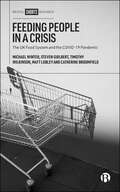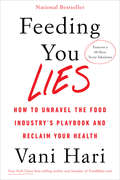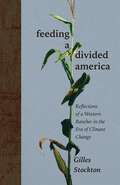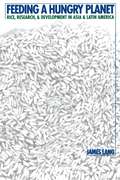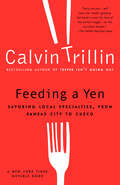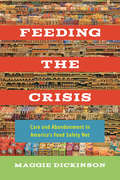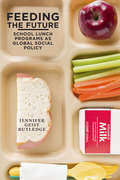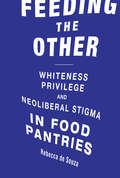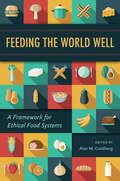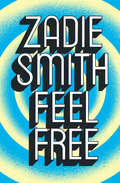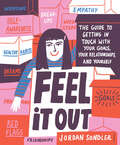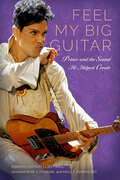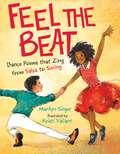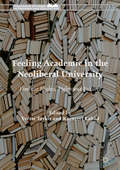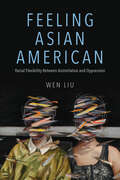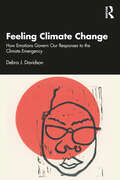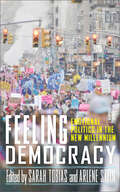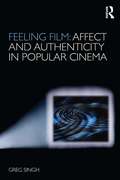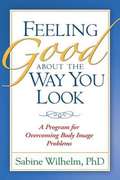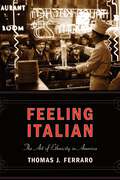- Table View
- List View
Feeding People in a Crisis: The UK Food System and the COVID-19 Pandemic
by Michael Winter Matt Lobley Steven Guilbert Timothy Wilkinson Catherine BroomfieldAvailable open access digitally under CC-BY-NC-ND licence. ‘Panic buying’ at the start of the COVID-19 pandemic generated enduring media images of empty supermarket shelves and calls for food rationing. The fragility of the 'just-in-time' food system was seemingly exposed yet, as the pandemic progressed in the UK, there were remarkably few food shortages. This book reveals the changing patterns of food provision in the UK during that period, looking at how diets changed and how retail, processing, distribution and production businesses adapted. But beneath the apparent logistical success story, there were injustices as the more vulnerable struggled to access good quality food and some businesses received inadequate help. The authors consider the winners and losers in a time of rapid social change, the lasting impacts on the UK food system and lessons to be learned for a food system dependent on imports and large retailers and with a high burden of diet-related health issues.
Feeding You Lies: How to Unravel the Food Industry's Playbook and Reclaim Your Health
by Vani HariThis follow-up to New York Times bestseller The Food Babe Way exposes the lies we've been told about our food--and takes readers on a journey to find healthy options.There's so much confusion about what to eat. Are you jumping from diet to diet and nothing seems to work? Are you sick of seeing contradictory health advice from experts? Just like the tobacco industry lied to us about the dangers of cigarettes, the same untruths, cover-ups, and deceptive practices are occurring in the food industry. Vani Hari, aka The Food Babe, blows the lid off the lies we've been fed about the food we eat--lies about its nutrient value, effects on our health, label information, and even the very science we base our food choices on. You'll discover: • How nutrition research is manipulated by food company-funded experts • How to spot fake news generated by Big Food • The tricks food companies use to make their food addictive • Why labels like "all natural" and "non-GMO" aren't what they seem and how to identify the healthiest food • Food marketing hoaxes that persuade us into buying junk food disguised as health foodVani guides you through a 48-hour Toxin Takedown to rid your pantry, and your body, of harmful chemicals--a quick and easy plan that anyone can do. A blueprint for living your life without preservatives, artificial sweeteners, additives, food dyes, or fillers, eating foods that truly nourish you and support your health, Feeding You Lies is the first step on a new path of truth in eating--and a journey to your best health ever.
Feeding a Divided America: Reflections of a Western Rancher in the Era of Climate Change (New Century Gardens and Landscapes of the American Southwest)
by Gilles StocktonIn Feeding a Divided America, third-generation Montana rancher and international agriculture development specialist Gilles Stockton explores the causes of what he refers to as the “rural-urban divide” and how this widening chasm between rural America and urban centers threatens our democracy. Indeed, it determines the structure of our society, including the physical and political landscapes in which we live. Stockton shows how big banks, international food conglomerates, urban expectations, and US farm policy have all furthered the demise of small towns across America.These essays provide a clear portrait of national food issues surrounding market competition, US trade policy, wildlife controversies, climate change, supply-chain disruptions, and US farm policy, topics that transcend all geopolitical boundaries. Stockton stands firm with American farmers and ranchers, offering potential remedies to these issues in the face of concerns over livelihood, the future of American food systems, and the future of our planet. Stockton’s essays are timely, and they challenge American urbanites and rural folk alike to find ways for all of us to coexist in a changing environment. Whether we eat may depend on it.
Feeding a Hungry Planet
by James LangRice is the food crop the world depends on most. In Feeding a Hungry Planet, James Lang demonstrates how research has benefited rice growers and increased production. He describes the life cycle of a rice crop and explains how research is conducted and how the results end up growing in a farmer's field. Focusing on Asia and Latin America, Lang explores lowland and upland rice systems, genetics, sustainable agriculture, and efforts to narrow the gap between yields at research stations and those on working farms. Ultimately, says Lang, the ability to feed growing populations and protect fragile ecologies depends as much on the sustainable on-site farm technologies as on high-yielding crop varieties. Lang views agriculture as a chain of events linking the farmer's field with the scientist's laboratory, and he argues that rice cultivation is shaped by different social systems, cultures, and environments. Describing research conducted by the International Rice Research Institute in the Philippines and by the International Center for Tropical Agriculture in Colombia, he shows how national programs tailor research to their own production problems. According to Lang, the interaction of research programs, practical problem solving, and local extension efforts suggests a new model for international development.
Feeding a Yen
by Calvin TrillinCalvin Trillin has never been a champion of the "continental cuisine" palaces he used to refer to as La Maison de la Casa House--nor of their successors, the trendy spots he calls "sleepy-time restaurants, where everything is served on a bed of something else." What he treasures is the superb local specialty. And he will go anywhere to find one.As it happens, some of Trillin's favorite dishes--pimientos de Padrón in northern Spain, for instance, or pan bagnat in Nice or posole in New Mexico--can't be found anywhere but in their place of origin. Those dishes are on his Register of Frustration and Deprivation. "On gray afternoons, I go over it," he writes, "like a miser who is both tantalizing and tormenting himself by poring over a list of people who owe him money." On brighter afternoons, he calls his travel agent. Trillin shares charming and funny tales of managing to have another go at, say, fried marlin in Barbados or the barbecue of his boyhood in Kansas City. Sometimes he returns with yet another listing for his Register--as when he travels to Ecuador for ceviche, only to encounter fanesca, a soup so difficult to make that it "should appear on an absolutely accurate menu as Potage Labor Intensive."We join the hunt for the authentic fish taco. We tag along on the "boudin blitzkrieg" in the part of Louisiana where people are accustomed to buying boudin and polishing it off in the parking lot or in their cars ("Cajun boudin not only doesn't get outside the state, it usually doesn't even get home"). In New York, we follow Trillin as he roams Queens with the sort of people who argue about where to find the finest Albanian burek and as he tries to use a glorious local specialty, the New York bagel, to lure his daughters back from California ("I understand that in some places out there if you buy a dozen wheat-germ bagels you get your choice of a bee-pollen bagel or a ginseng bagel free").Feeding a Yen is a delightful reminder of why New York magazine called Calvin Trillin "our funniest food writer."From the Hardcover edition.
Feeding the City
by Sara RoncagliaEvery day in Mumbai 5,000 dabbawalas (literally translated as "those who carry boxes") distribute a staggering 200,000 home-cooked lunchboxes to the city’s workers and students. Giving employment and status to thousands of largely illiterate villagers from Mumbai's hinterland, this co-operative has been in operation since the late nineteenth century. It provides one of the most efficient delivery networks in the world: only one lunch in six million goes astray. Feeding the City is an ethnographic study of the fascinating inner workings of Mumbai's dabbawalas. Cultural anthropologist Sara Roncaglia explains how they cater to the various dietary requirements of a diverse and increasingly global city, where the preparation and consumption of food is pervaded with religious and cultural significance. Developing the idea of "gastrosemantics" – a language with which to discuss the broader implications of cooking and eating – Roncaglia's study helps us to rethink our relationship to food at a local and global level. The publication of this book is financed by the generous support of interested readers and organisations, who made donations using the crowd-funding website unglue.it
Feeding the Crisis: Care and Abandonment in America's Food Safety Net (California Studies in Food and Culture #71)
by Maggie DickinsonThe Supplemental Nutrition Assistance Program (SNAP), formerly known as food stamps, is one of the most controversial forms of social welfare in the United States. Although it’s commonly believed that such federal programs have been cut back since the 1980s, Maggie Dickinson charts the dramatic expansion and reformulation of the food safety net in the twenty-first century. Today, receiving SNAP benefits is often tied to work requirements, which essentially subsidizes low-wage jobs. Excluded populations—such as the unemployed, informally employed workers, and undocumented immigrants—must rely on charity to survive.Feeding the Crisis tells the story of eight families as they navigate the terrain of an expanding network of assistance programs in which care and abandonment work hand in hand to make access to food uncertain for people on the social and economic margins. Amid calls at the federal level to expand work requirements for food assistance, Dickinson shows us how such ideas are bad policy that fail to adequately address hunger in America. Feeding the Crisis brings the voices of food-insecure families into national debates about welfare policy, offering fresh insights into how we can establish a right to food in the United States.
Feeding the Future: School Lunch Programs as Global Social Policy
by Jennifer Geist RutledgeA century ago, only local charities existed to feed children. Today 368 million children receive school lunches in 151 countries, in programs supported by state and national governments. In Feeding the Future, Jennifer Geist Rutledge investigates how and why states have assumed responsibility for feeding children, chronicling the origins and spread of school lunch programs around the world, starting with the adoption of these programs in the United States and some Western European nations, and then tracing their growth through the efforts of the World Food Program. The primary focus of Feeding the Future is on social policy formation: how and why did school lunch programs emerge? Given that all countries developed education systems, why do some countries have these programs and others do not? Rutledge draws on a wealth of information--including archival resources, interviews with national policymakers in several countries, United Nations data, and agricultural statistics--to underscore the ways in which a combination of ideological and material factors led to the creation of these enduringly popular policies. She shows that, in many ways, these programs emerged largely as an unintended effect of agricultural policy that rewarded farmers for producing surpluses. School lunches provided a ready outlet for this surplus. She also describes how, in each of the cases of school lunch creation, policy entrepreneurs, motivated by a commitment to alleviate childhood malnutrition, harnessed different ideas that were relevant to their state or organization in order to funnel these agricultural surpluses into school lunch programs. The public debate over how we feed our children is becoming more and more politically charged. Feeding the Future provides vital background to these debates, illuminating the history of food policies and the ways our food system is shaped by global social policy.
Feeding the Other: Whiteness, Privilege, and Neoliberal Stigma in Food Pantries (Food, Health, and the Environment)
by Rebecca T. De SouzaHow food pantries stigmatize their clients through a discourse that emphasizes hard work, self help, and economic productivity rather than food justice and equity.The United States has one of the highest rates of hunger and food insecurity in the industrialized world, with poor households, single parents, and communities of color disproportionately affected. Food pantries—run by charitable and faith-based organizations—rather than legal entitlements have become a cornerstone of the government's efforts to end hunger. In Feeding the Other, Rebecca de Souza argues that food pantries stigmatize their clients through a discourse that emphasizes hard work, self help, and economic productivity rather than food justice and equity. De Souza describes this “framing, blaming, and shaming” as “neoliberal stigma” that recasts the structural issue of hunger as a problem for the individual hungry person.De Souza shows how neoliberal stigma plays out in practice through a comparative case analysis of two food pantries in Duluth, Minnesota. Doing so, she documents the seldom-acknowledged voices, experiences, and realities of people living with hunger. She describes the failure of public institutions to protect citizens from poverty and hunger; the white privilege of pantry volunteers caught between neoliberal narratives and social justice concerns; the evangelical conviction that food assistance should be “a hand up, not a handout”; the culture of suspicion in food pantry spaces; and the constraints on food choice. It is only by rejecting the neoliberal narrative and giving voice to the hungry rather than the privileged, de Souza argues, that food pantries can become agents of food justice.
Feeding the World Well: A Framework for Ethical Food Systems
by Alan M. GoldbergLeading experts reveal ways that the future of food production for the world's burgeoning population can (and must) be both sustainable and ethical.In the United States, food is abundant and cheap but loaded with hidden costs to the environment, human health, animal welfare, and the people who work in our food systems. The country's current food production systems lack diversity in crops and animals and are intensified but not sustainable, inhumane in the treatment of animals, and inconsiderate of labor. In order to feed the world's rapidly growing population with high-quality, ethically produced food, new food production systems are urgently needed. These new systems must be genetically diverse and environmentally sustainable, and they need to follow internationally recognized animal welfare and labor practices.Feeding the World Well examines these costs of cheap food while presenting a unique framework for ethical food systems: the Core Ethical Commitments, which are designed to guide consumers in choosing foods that are aligned with their values while helping producers enhance the ethics of their practices and products. Edited by Alan M. Goldberg, the volume features contributions from leading ethicists and food systems experts. Addressing complex issues such as climate change, worker exploitation, obesity, antibiotic resistance, wasted food, and biotechnology, the book discusses the fundamental forces that have shaped, and will continue to shape, our food systems. It also describes some of the approaches that food companies and nonprofit organizations are using to address the ethical challenges facing these food systems. Finally, the book explains what the Core Ethical Commitments are (and what they are not), how they were developed, and how they might be used by food system actors.By bringing together an all-star group of contributors from academia and industry, Feeding the World Well sets a new course for food production and how it is evaluated. By including the voices of industry leaders alongside those of researchers and regulators, the book prepares the food production industry for a world in which "ethical" or "sustainable" production practices are not only trendy but necessary to ensure that we can feed the world's growing population. Conceived as a textbook for food studies courses, this volume will appeal to anyone who is strongly interested in food, including conscious consumers, food industry leaders, researchers, and policy makers.Contributors: Anne Barnhill, Martin W. Bloem, Jonathan Bloom, Nicole M. Civita, Claire Davis, Michiel van Dijk, Adele Douglass, Shauna Downs, Kevin Esvelt, Ruth Faden, Jessica Fanzo, Evan Fraser, Maisie Ganzler, Tara Garnett, Sara Glass, Alan M. Goldberg, Christopher Good, Meredith Kaufman, Gillian Kelleher, Frederick L. Kirschenmann, Herman B. W. M. Koëter, Jennifer Kuzma, Kees van Leeuwen, Robert Martin, Anne E. McBride, Suzanne McMillan, Tom Morley, Marion Nestle, Peter O'Driscoll, Lance B. Price, Marie Luise Rau, Bernard Rollin, Yashar Saghai, Susan A. Schneider, Ellen K. Silbergeld, Paul B. Thompson, Paul Willis, Sylvia Wulf
Feedsack Secrets: Fashion from Hard Times
by Gloria NixonA quilt historian chronicles the fascinating yet untold story of feedsack quilts made in America during the Great Depression and WWII. Feedsacks weren&’t meant for anything more than their name implies until hard times changed the way people looked at available resources. In the 1930s and 40s, quilters facing poverty and fabric shortages found that these cotton bags could be repurposed into something beautiful. Manufacturers capitalized on the trend by designing their bags with stylish patterns, like the iconic gingham. In Feedsack Secrets, quilt historian Gloria Nixon shares the story of the patterned feedsack with research culled from old farm periodicals, magazines and newspapers. Along the way, she reveals how women met for sack-and-snack-club fabric swaps; there were restrictions on jacket lengths, hem depths and the sweep of a skirt; and feedsack prints and bags played a part in political contests, even accurately predicting that Truman would win the 1948 presidential election.
Feel Free
by Zadie SmithA timely, powerful collection of essays from one of our sharpest minds and most sparkling stylists. <p><p> How much joy can a person tolerate? How many kinds of boredom make up a life? Who owns the story of black America? Should Justin Bieber be more like Socrates? And why is there a dead art collector floating in the swimming pool? <p> Dazzlingly insightful, explosively funny and ever-timely, Zadie Smith is back with a second unmissable collection of essays. From German Old Masters to the new masters of East Coast rap, from social networks opening lines of communication to national referenda closing doors, Feel Free reaches out in all directions and draws back a rich feast of ideas. Here pop culture, high culture, social change and political debate all get the Zadie Smith treatment: dissected with razor-sharp intellect, set brilliantly against the context of the utterly contemporary, and considered with a deep humanity and compassion. <p> With the easy intimacy of a local and the piercing clarity of an outsider, Feel Free casts a sharp critical eye over the creative luminaries that have shaped our world: from J. G. Ballard to Karl Ove Knausgaard, Orson Welles to Charlie Kaufman, Joni Mitchell to Beyonce, and far beyond. And it considers the points of contact where the author herself meets this world, where the political meets the personal and critique meets memoir. This electrifying new collection showcases Zadie Smith as a true literary powerhouse, demonstrating once again her credentials as an essential voice of her generation.
Feel It Out: The Guide to Getting in Touch with Your Goals, Your Relationships, and Yourself
by Jordan SondlerNot everything is about you (but this book is).Still figuring it all out? Cool, so are we. Feel It Out is a guide to celebrating where you are now, even if heartbreaks, career setbacks, growing pains, and preconceptions about where you should be by now are getting in your way. Think of this as a coming-of-age book for adults, a self-love pep talk that will teach you how to get to the core of who you are and find out what you truly want, to cultivate a hot and heavy relationship with YOU, first and foremost. This approachable and empowering book offers everything you need to cut through the noise, feel your feelings, treat yourself well, and get yourself right, so you can get out there and live your best and most exciting life.
Feel My Big Guitar: Prince and the Sound He Helped Create (American Made Music Series)
by Judson L. Jeffries, Shannon M. Cochran, and Molly ReinhoudtContributions by Ignatius Calabria, H. Zahra Caldwell, Brian Jude de Lima, Sabatino DiBernardo, William Fulton, Antonio Garfias, Judson L. Jeffries, Tony Kiene, Molly Reinhoudt, Fred Shaheen, and Karen Turman With his signature blend of genres and lyrics that touch on myriad societal issues, the artist Prince (1958–2016) has challenged and captivated the minds and hearts of countless listeners. Feel My Big Guitar: Prince and the Sound He Helped Create is a wide-ranging collection that seeks to place Prince at the center of contemporary musical scholarship, putting him in proper cultural and political context. This edited volume includes a mix of essays and reflections by scholars and fans, as well as interviews with people who worked with and knew Prince personally. Employing a blend of methodologies, contributors offer a body of fresh, intriguing, thought-provoking, and mind-bending work about Prince—an artist whose music exemplified those very characteristics.The volume examines Prince's musical influences, his rivalries (both real and imagined), and instrumental eroticism. It includes enlightening interviews with early mentor Pépe Willie and Gayle Chapman, Prince’s first female bandmate. These personal reflections and interviews grant readers a unique lens through which to view Prince, enriching our overall understanding of the man. Ultimately, Feel My Big Guitar serves as a space for sharing musicological analysis and memories about an artist whose work has touched and inspired so many. Years in the making, this is the first book in an ongoing scholarly project, PrincEnlighteNmenT: A Study of Society through Music, intended to investigate and reveal the full spectrum of Prince’s life and work.
Feel the Beat: Dance Poems that Zing from Salsa to Swing
by Marilyn SingerAn irresistible book of poems about dancing that mimic the rhythms of social dances from cha-cha to two-step, by the acclaimed author of Mirror Mirror Marilyn Singer has crafted a vibrant collection of poems celebrating all forms of social dance from samba and salsa to tango and hip-hop. The rhythm of each poem mimics the beat of the dances&’ steps. Together with Kristi Valiant&’s dynamic illustrations, the poems create a window to all the ways dance enters our lives and exists throughout many cultures. This ingenious collection will inspire readers to get up and move!Included with the e-book is an audio recording of the author reading each poem accompanied by original music.
Feel the Grass Grow: Ecologies of Slow Peace in Colombia
by Angie LederachOn November 24, 2016, the Colombian government and the Revolutionary Armed Forces of Colombia signed a revised peace accord that marked a political end to over a half-century of war. Feel the Grass Grow traces the far less visible aspects of moving from war to peace: the decades of campesino struggle to defend life, land, and territory prior to the national accord, as well as campesino social leaders' engagement with the challenges of the state's post-accord reconstruction efforts. In the words of the campesino organizers, "peace is not signed, peace is built." Drawing on nearly a decade of extensive ethnographic and participatory research, Angela Jill Lederach advances a theory of "slow peace." Slowing down does not negate the urgency that animates the defense of territory in the context of the interlocking processes of political and environmental violence that persist in post-accord Colombia. Instead, Lederach shows how the campesino call to "slowness" recenters grassroots practices of peace, grounded in multigenerational struggles for territorial liberation. In examining the various layers of meaning embedded within campesino theories of "the times (los tiempos)," this book directs analytic attention to the holistic understanding of peacebuilding found among campesino social leaders. Their experiences of peacebuilding shape an understanding of time as embodied, affective, and emplaced. The call to slow peace gives primacy to the everyday, where relationships are deepened, ancestral memories reclaimed, and ecologies regenerated.
Feeling Academic in the Neoliberal University: Feminist Flights, Fights and Failures (Palgrave Studies in Gender and Education)
by Yvette Taylor Kinneret LahadThis book offers a contemporary account of what it means to inhabit academia as a privilege, risk, entitlement or a failure. Drawing on international perspectives from a range of academic disciplines, it asks whether feminist spaces can offer freedom or flight from the corporatized and commercialized neoliberal university. How are feminist voices felt, heard, received, silenced, and masked? What is it to be a feminist academic in the neoliberal university? How are expectations, entitlements and burdens felt in inhabiting feminist positions and what of 'bad feeling' or 'unhappiness' amongst feminists? The volume consider these issues from across the career course, including from 'early career' and senior established scholars, as these diverse categories are themselves entangled in academic structures, sentiments and subjectivities; they are solidified in, for example, entry and promotion schemes as well as funding calls, and they ask us to identify in particular stages of 'being' or 'becoming' academic, while arguably denying the possibility of ever arriving. It will be essential reading for students and researchers in the areas of Education, Sociology, and Gender Studies.
Feeling Asian American: Racial Flexibility Between Assimilation and Oppression (NWSA / UIP First Book Prize)
by Wen LiuAsian Americans have become the love-hate subject of the American psyche: at times celebrated as the model minority, at other times hated as foreigners. Wen Liu examines contemporary Asian American identity formation while placing it within a historical and ongoing narrative of racial injury. The flexible racial status of Asian Americans oscillates between oppression by the white majority and offers to assimilate into its ranks. Identity emerges from the tensions produced between those two poles. Liu dismisses the idea of Asian Americans as a coherent racial population. Instead, she examines them as a raced, gendered, classed, and sexualized group producing varying physical and imaginary boundaries of nation, geography, and citizenship. Her analysis reveals repeated norms and acts that capture Asian Americanness as part of a racial imagination that buttresses capitalism, white supremacy, neoliberalism, and the US empire. An innovative challenge to persistent myths, Feeling Asian American ranges from the wartime origins of Asian American psychology to anti-Asian attacks to present Asian Americanness as a complex political assemblage.
Feeling Backward: Loss and the Politics of Queer History
by Heather LoveFeeling Backward weighs the costs of the contemporary move to the mainstream in lesbian and gay culture. While the widening tolerance for same-sex marriage and for gay-themed media brings clear benefits, gay assimilation entails other losses--losses that have been hard to identify or mourn, since many aspects of historical gay culture are so closely associated with the pain and shame of the closet.<P> Feeling Backward makes an effort to value aspects of historical gay experience that now threaten to disappear, branded as embarrassing evidence of the bad old days before Stonewall. It looks at early-twentieth-century queer novels often dismissed as "too depressing" and asks how we might value and reclaim the dark feelings that they represent. Heather Love argues that instead of moving on, we need to look backward and consider how this history continues to affect us in the present.<P> Through elegant readings of Walter Pater, Willa Cather, Radclyffe Hall, and Sylvia Townsend Warner, and through stimulating engagement with a range of critical sources, Feeling Backward argues for a form of politics attentive to social exclusion and its effects.
Feeling Climate Change: How Emotions Govern Our Responses to the Climate Emergency
by Debra J. DavidsonExamining the social response to the mounting impacts of climate change, Feeling Climate Change illuminates what the pathways from emotions to social change look like—and how they work—so we can recognize and inform our collective attempts to avert further climate catastrophe.Debra J. Davidson engages with how our actions are governed by a complex of rules, norms, and predispositions, central among which operates our emotionality, to assess individual and collective responses to the climate crisis, applying a critical and constructive analysis of human social prospects for confronting the climate emergency in manners that minimize the damage and perhaps even enhance the prospects for meaningful collective living.Providing a crucial understanding of our emotionality and its role in individual behaviour, collective action, and ultimately in social change, this book offers researchers, policymakers, and citizens essential insights into our personal and collective responses to the climate emergency.
Feeling Democracy: Emotional Politics in the New Millennium (The Feminist Bookshelf: Ideas for the 21st Century)
by Sarah Tobias Arlene Stein Nermin Allam Kathryn Abrams Noëlle McAfee Ciara Torres-Spelliscy Kirin Gupta Ileana NachescuCultural critic Lauren Berlant wrote that “politics is always emotional,” and her words hold especially true for politics in the twenty-first century. From Obama to Trump, from Black Lives Matter to the anti-abortion movement, politicians and activists appeal to hope, fear, anger, and pity, all amplified by social media. The essays in Feeling Democracy examine how both reactionary and progressive politics are driven largely by emotional appeals to the public. The contributors in this collection cover everything from immigrants’ rights movements to white nationalist rallies to show how solidarities forged around gender, race, and sexuality become catalysts for a passionate democratic politics. Some essays draw parallels between today’s activist strategies and the use of emotion in women-led radical movements from the 1960s and 1970s, while others expand the geographic scope of the collection by considering Asian decolonial politics and Egyptian pro-democracy protests. Incorporating scholarship from fields as varied as law, political science, philosophy, psychoanalysis, and history, Feeling Democracy considers how emotional rhetoric in politics can be a double-edged sword—often wielded by authoritarian populists who seek to undermine democracy but sometimes helping to bring about a genuine renewal of participatory democracy.
Feeling Film: Affect And Authenticity In Popular Cinema
by Greg SinghCinema has the capacity to enflame our passions, to arouse our pity, to inspire our love. Feeling Film is a book that examines the emotional encounters found in contemporary popular cinema cultures. Examining melodrama, film noir, comic book franchises, cult indie movies and romantic comedy within the context of a Jungian-informed psychology and contemporary movements in film-philosophy, this book considers the various kinds of feelings engendered by our everyday engagements with cinema. Greg Singh questions the popular idea of what cinema is, and considers what happens during the anticipation and act of watching a movie, through to the act of sharing our feelings about them, the reviewing process and repeat-viewing practices. Feeling Film does this through a critique of purely textual approaches, instead offering a model which emphasises lived, warm (embodied and inhabited) psychological relationships between the viewer and the viewed. It extends the narrative action of cinema beyond the duration of the screening into realms of anticipation and afterlife, in particular providing insight into the tertiary and participatory practices afforded through rich media engagement. In rethinking the everyday, co-productive relationship between viewer and viewed from this perspective, Feeling Film reinstates the importance of feelings as a central concern for film theory. What emerges from this study is a re-engagement of the place of emotion, affect and feeling in film theory and criticism. In reconsidering the duration of the cinematic encounter, Feeling Film makes a significant contribution to the understanding of the inter-subjective relationship between viewer and viewed. It takes post-Jungian criticism into the realms of post-cinema technologies and reignites the dialogue between depth psychology and the study of images as they appear to, and for, us. This book will make essential reading for those interested in the relationship between film and aspects of depth psychology, film and philosophy students at advanced undergraduate and postgraduate levels, film and cinema academics and cinephiles.
Feeling Global: Internationalism in Distress (Cultural Front #5)
by Bruce RobbinsIs global culture merely a pale and sinister reflection of capitalist globalization? Bruce Robbins responds to this and other questions in Feeling Global, a crucial document on nationalism, culturalism, and the role of intellectuals in the age of globalization. Building on his previous work, Robbins here takes up the question of the status of international human rights. Robbins' conception of internationalism is driven not only by the imperatives of global human rights policy, but by an understanding of transnational cultures, thus linking practical policymaking to cultural politics at the expense of neither. Robbins' cultural criticism, in other words, affords us much more than an understanding of how culture "shapes our lives." Instead, Robbins shows, particularly in his discussions of Martha Nussbaum, Richard Rorty, Susan Sontag, Michael Walzer and others, how "culture" itself has become a term that blocks—for commentators on both the right and the left—serious engagement with the contemporary cosmopolitan ideal of a nonuniversalist discourse of human rights. Rescuing "cosmopolitanism" itself from its connotations of leisured individuals loyal to no one and willing to sample all cultures at will, Feeling Global presents a compelling way to think about the ethical obligations of intellectuals at a time when their place in the new world order is profoundly uncertain.
Feeling Good about the Way You Look
by Sabine WilhelmIn a society where a blemish or "bad hair" can ruin an otherwise perfect day and airbrushed abs dominate the magazine rack, many of us feel ashamed of our bodies. If dissatisfaction with your looks is a distressing preoccupation, this compassionate book offers a way to break free from the mirror. Harvard psychologist Sabine Wilhelm leads you through a step-by-step program that helps you fight the urge to spend hours "fixing" your skin and hair, working out, or shopping for flattering clothes. Reality-check exercises based on cognitive-behavioral therapy demonstrate how to identify unfounded beliefs about your appearance. Once you understand the negative thoughts and feelings that distort your self-image, you'll be able to shed lengthy grooming rituals and overcome the embarrassment that keeps you from enjoying life. With Dr. Wilhelm's expert guidance, you'll learn to replace self-doubt and insecurity with confidence and a positive outlook. Whether you've spent thousands on plastic surgery or avoid trips to the beach, dating, or socializing, you owe yourself this opportunity to make peace with your looks. If you or someone you care about is struggling with a body image problem, effective care is finally at hand.
Feeling Italian: The Art of Ethnicity in America (Nation of Nations #18)
by Thomas J. Ferraro2006 American Book Award, presented by the Before Columbus FoundationSouthern Italian emigration to the United States peaked a full century ago—;descendents are now fourth and fifth generation, dispersed from their old industrial neighborhoods, professionalized, and fully integrated into the “melting pot.” Surely the social historians are right: Italian Americans are fading into the twilight of their ethnicity. So, why is the American imagination enthralled by The Sopranos, and other portraits of Italian-ness? Italian American identity, now a mix of history and fantasy, flesh-and-bone people and all-too-familiar caricature, still has something to teach us, including why each of us, as citizens of the U.S. twentieth century and its persisting cultures, are to some extent already Italian. Contending that the media has become the primary vehicle of Italian sensibilities, Ferraro explores a series of books, movies, paintings, and records in ten dramatic vignettes. Featured cultural artifacts run the gamut, from the paintings of Joseph Stella and the music of Frank Sinatra to The Godfather’s enduring popularity and Madonna’s Italian background. In a prose style as vivid as his subjects, Ferraro fashions a sardonic love song to the art and iconography of Italian America.
